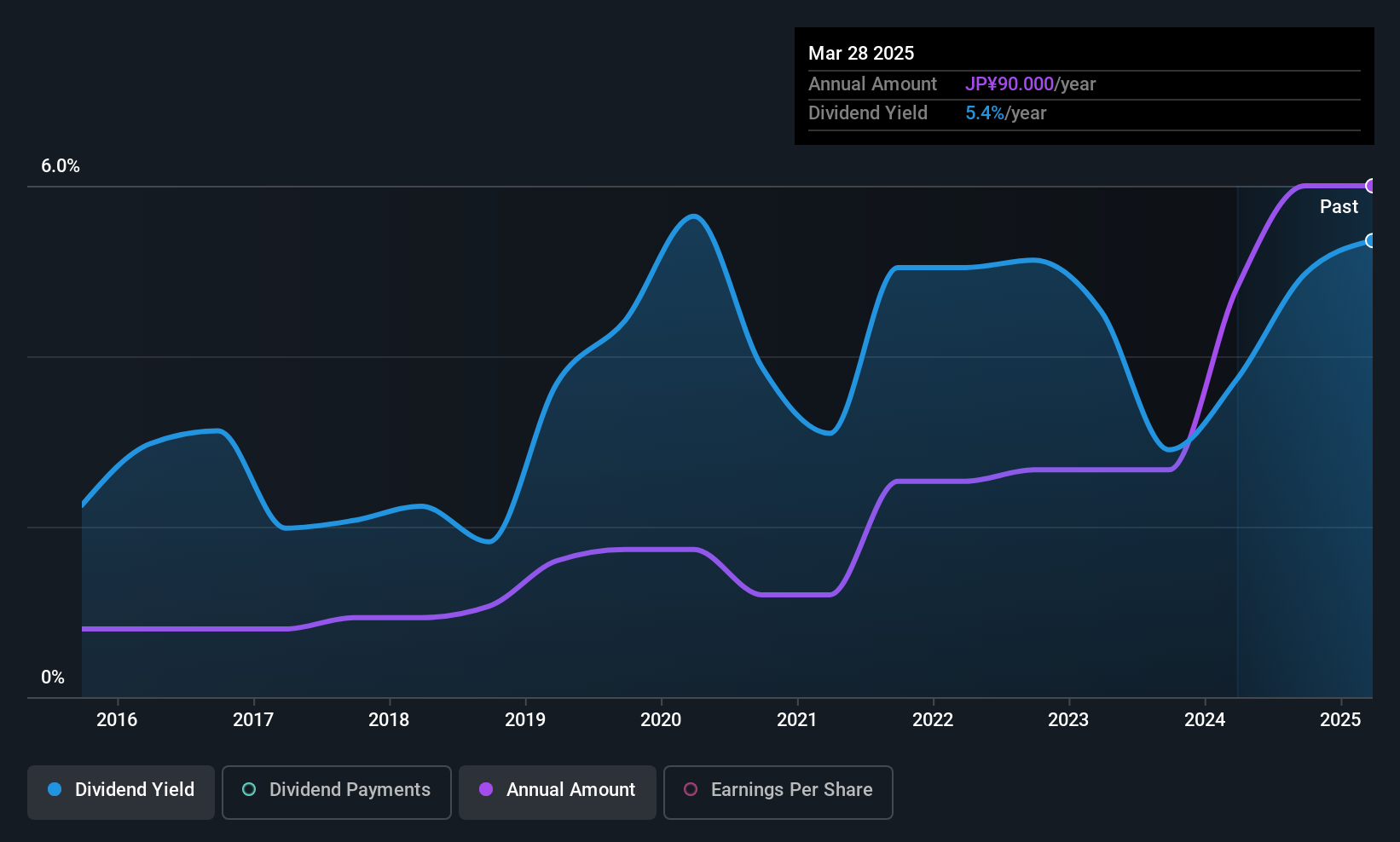Shinagawa Refractories Co., Ltd. (TSE:5351) has announced that it will pay a dividend of ¥45.00 per share on the 2nd of December. Based on this payment, the dividend yield on the company's stock will be 4.7%, which is an attractive boost to shareholder returns.
Shinagawa Refractories' Payment Could Potentially Have Solid Earnings Coverage
If the payments aren't sustainable, a high yield for a few years won't matter that much. Based on the last payment, Shinagawa Refractories was quite comfortably earning enough to cover the dividend. This indicates that quite a large proportion of earnings is being invested back into the business.
If the trend of the last few years continues, EPS will grow by 9.6% over the next 12 months. If the dividend continues along recent trends, we estimate the payout ratio will be 52%, which is in the range that makes us comfortable with the sustainability of the dividend.

View our latest analysis for Shinagawa Refractories
Shinagawa Refractories Has A Solid Track Record
The company has been paying a dividend for a long time, and it has been quite stable which gives us confidence in the future dividend potential. Since 2015, the annual payment back then was ¥10.00, compared to the most recent full-year payment of ¥90.00. This means that it has been growing its distributions at 25% per annum over that time. Rapidly growing dividends for a long time is a very valuable feature for an income stock.
Shinagawa Refractories Could Grow Its Dividend
Investors who have held shares in the company for the past few years will be happy with the dividend income they have received. We are encouraged to see that Shinagawa Refractories has grown earnings per share at 9.6% per year over the past five years. Earnings are on the uptrend, and it is only paying a small portion of those earnings to shareholders.
We Really Like Shinagawa Refractories' Dividend
In summary, it is good to see that the dividend is staying consistent, and we don't think there is any reason to suspect this might change over the medium term. The company is easily earning enough to cover its dividend payments and it is great to see that these earnings are being translated into cash flow. Taking this all into consideration, this looks like it could be a good dividend opportunity.
Companies possessing a stable dividend policy will likely enjoy greater investor interest than those suffering from a more inconsistent approach. At the same time, there are other factors our readers should be conscious of before pouring capital into a stock. For example, we've picked out 1 warning sign for Shinagawa Refractories that investors should know about before committing capital to this stock. Is Shinagawa Refractories not quite the opportunity you were looking for? Why not check out our selection of top dividend stocks.
New: Manage All Your Stock Portfolios in One Place
We've created the ultimate portfolio companion for stock investors, and it's free.
• Connect an unlimited number of Portfolios and see your total in one currency
• Be alerted to new Warning Signs or Risks via email or mobile
• Track the Fair Value of your stocks
Have feedback on this article? Concerned about the content? Get in touch with us directly. Alternatively, email editorial-team (at) simplywallst.com.
This article by Simply Wall St is general in nature. We provide commentary based on historical data and analyst forecasts only using an unbiased methodology and our articles are not intended to be financial advice. It does not constitute a recommendation to buy or sell any stock, and does not take account of your objectives, or your financial situation. We aim to bring you long-term focused analysis driven by fundamental data. Note that our analysis may not factor in the latest price-sensitive company announcements or qualitative material. Simply Wall St has no position in any stocks mentioned.
About TSE:5351
Shinagawa Refra
Engages in the manufacture and sale of refractory products in Japan and internationally.
6 star dividend payer and good value.
Market Insights
Community Narratives




